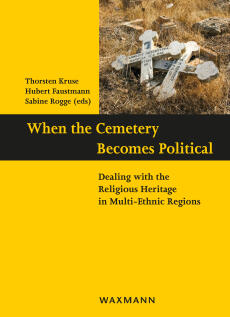
Thorsten Kruse, Hubert Faustmann, Sabine Rogge (Hrsg.)
When the Cemetery Becomes Political - Dealing with the Religious Heritage in Multi-Ethnic Regions
Schriften des Instituts für Interdisziplinäre Zypern-Studien, Bd. 14
(Münster – New York 2020)
The title of this book ‘When the Cemetery Becomes Political’ implies the question: How can the cemetery – a place for the dead – become a space that develops a political dynamic? Scholars from Bosnia-Herzegovina, Cyprus, Germany, Greece, Lebanon, Switzerland, the Netherlands and the United Kingdom explored such dynamics further in three conferences – one held in Münster/Germany (2017) and the other two in Nicosia/Cyprus (2018/2019). Ten of the papers presented at these conferences are compiled in this volume. They investigate how religious heritage is dealt with in multi-ethnic/religious countries like Bosnia-Herzegovina, Cyprus and Lebanon; and one of the papers focuses on the fate of Thessaloniki’s huge Jewish cemetery destructed during the German occupation of Greece in World War II.
Further questions addressed in this book are: Why does one group destroy or desecrate the cemeteries and places of worship of the other group(s) during interreligious or interethnic conflicts? What are the reasons behind such extreme actions, and what is the purpose of such acts of destruction? The book gives insights into the complex and complicated interaction between religion and politics, and by expanding the scholarly work on religious heritage sites, it contributes to the discussion of a hot topic of our times.
Contents
Preface and Acknowledgements
Section I: BOSNIA AND HERZEGOVINA
- Željana Tunić, The meaning of bones in post-conflict societies
Section II: CYPRUS
- Theodosios Tsivolas, Cypriot religious heritage. Legal reflections on a divided cultural property
- Thorsten Kruse, The fate of the religious heritage of Cyprus in the reports of international organisations: the northern part of Cyprus
- Petros Savvides, The Islamization of occupied Cyprus: A religious affair or political engineering?
- Lisa Dikomitis & Vassos Argyrou, The politics of restoring religious sites and cemeteries in the north of Cyprus: An ethnography among Greek Cypriot refugees
- Theopisti Stylianou-Lambert & Alexandra Bounia, Cultural ‘wars’, religious artefacts, and visitors: Icon museums and the Women of St Barnabas
Section III: GREECE
- Leon Saltiel, The destruction of Thessaloniki’s Jewish cemetery
Section IV: LEBANON
- Elie Al Hindy, Religious pluralism – problems and solutions
- Ziad Fahed, From war to reconciliation – lessons from and for Lebanon: The role of religions in peacebuilding in time of war
- Dima de Clerck, The place of the Christian dead in southern Mount Lebanon
226 Seiten, mit zahlreichen Abbildungen
Broschiert: € 34,90, ISBN 978-3-8309-4265-8 (Online-Bestellung)
E-Book: € 30,99, ISBN 978-3-8309-9265-3 (Online-Bestellung)


